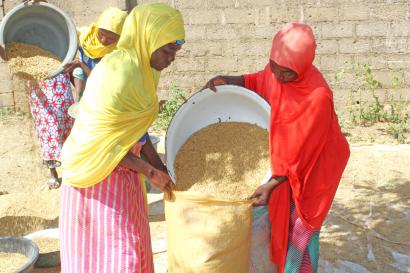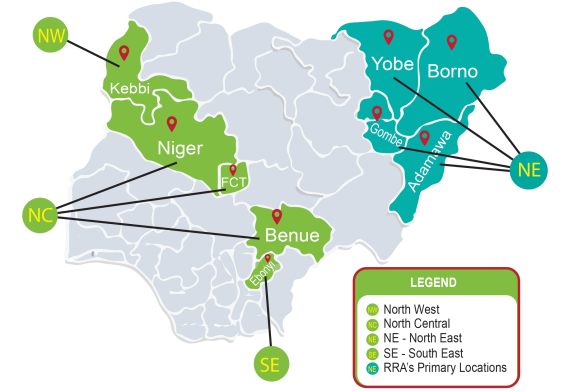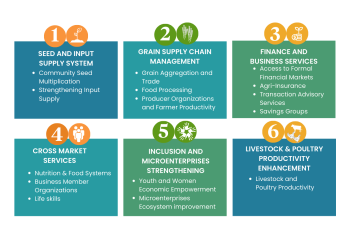Breadcrumb
Feed the Future Nigeria Rural Resilience Activity

About The Rural Resilience Activity
The Feed the Future Nigeria Rural Resilience Activity (RRA) is a five-year (2019 - 2024), USAID-funded program which seeks to facilitate economic recovery and growth in vulnerable, conflict-affected areas by promoting systemic change in market systems. The Activity is part of the U.S. Government's global hunger and food security initiative aimed at developing the agriculture sectors and breaking the vicious cycle of poverty and hunger in some of the world's poorest countries. The Activity empowers vulnerable households, communities, and systems to cope with current shocks and stresses and to be prepared to withstand future ones.
The Activity is implemented by Mercy Corps, in partnership with the International Fertilizer Development Center (IFDC) and Save the Children International (SCI), primarily in the Northeast states of Adamawa, Borno, Gombe, and Yobe.
Through the COVID-19 Mitigation Response Program, the Activity's operational areas also included Benue, Kebbi, Niger and Ebonyi states, as well as the Federal Capital Territory. The Activity is responding to the secondary impacts of global shocks (including the Ukraine-Russia war) on farmers and vulnerable households. The Rural Resilience Activity received additional funding from USAID to cushion the effects of the increase in fuel, food and fertilizer on farmers’ productivity and to strengthen wheat production value-chain in Northeast Nigeria. The value chains supported by the Activity are maize, cowpea, groundnut, wheat and rice, as well as small ruminants, poultry and microenterprises. Using market-led approaches, the Activity will sustainably move over 600,000 individuals (internally displaced persons, farmers, agri-business owners, youth, women, private sector entities, and other stakeholders) out of chronic vulnerability and poverty across implementation states.

Our Results and Impact
To date, the Activity has reached 506,425 million people - men, women, youths, persons with disabilities, and internally displaced persons in Nigeria - through partners’ activities and direct implementation. The Activity has built partnerships with 80 private sector partners, out of which 31 of them have received catalytic grants to scale or expand their businesses in Northeast Nigeria. This has resulted in the creation of 12,256 jobs and the facilitation of US$51,974,962 in sales and US$14,878,253 in loans (access to credit) by participants. The Activity has also mobilized US$6,768,059 in leverage - monies contributed by private-sector partners to the Activity’s goals.
Through the COVID-19 Mitigation Response, an additional fund from USAID, the Activity delivered cash transfers to 52,947 smallholder farmers and microenterprise owners, 45 agro-firms, and 40 women cowpea processors in the Feed the Future portfolio states of Borno, Yobe, Adamawa, Gombe, Kebbi, Niger, Benue, and Ebonyi, and the FCT over a period of 10 months.
-
506k
-
129k
-
12k
How We Work
The Feed the Future Nigeria Rural Resilience Activity adopts a Market System Development (MSD) approach, which entails creating the foundation for lasting change where a market system—its functions and players—is equipped to meet current and future challenges and continues to meet the changing needs for market participants. This approach helps us to integrate strategic interventions designed to incrementally build resilience capacities and facilitate the emergence of accessible and quality opportunities in market systems in Northeast Nigeria for the purpose of reducing poverty for households. This effort is combined with the COVID-19 Mitigation Response and the Ukraine Russia War Response intervention aimed at helping market actors withstand the secondary shocks and stresses presented by COVID-19 and the Ukraine Russia War.
RRA plays a facilitation role in the Northeast Agribusiness market systems, mobilizing investments for unproven business models in a more sustainable way to empower people in the Northeast on their journey to self-reliance. Through the Enterprise Invesstment Fund (EIF), the Activity mobilizes, de-risks, and incentivizes public and private investments; strengthens local capacities; and accelerates enterprise-driven development that can build the resilience of pro-poor individuals, communities and businesses in the region.
Our Vision for Northeast Nigeria
The Activity envisions a Northeast Nigeria that achieves transformation in its economy, driven by competitive, inclusive, and resilient growth – where growth withstands the test of time, and supported by structures and systems with the ability to adapt and evolve, overcome risks and challenges, and create new opportunities to maintain growth.
Our Intervention Areas
In its fourth year, the Activity is delivering in six intervention areas through 15 interventions, which are building the resilience of smallholder farmers, microenterprise owners, grain aggregators, livestock producers, producer organizations etc to the shocks and stresses characterized by the Northeast market systems. The Northeast market systems are affected by insecurity and macroeconomic factors such as inflation and currency devaluation, which have increased the prices of fuel, fertilizers and food. Climatic conditions such as flooding and early cessation of rain have impacted yields and the region’s food security. The Rural Resilience Activity’s interventions are designed to maximize the shock-responsive supply of goods and services, stimulate the adoption of good agricultural and other best practices, strengthen linkages along the value chains and build relationships between the various market players. The intervention areas and interventions of the Activity are shown in the illustration below:

Resources
Annual Impact Reports
Workplan
Learning Briefs / Assessments
- Layering Cash into Market Systems Programs: Catalyzing Market-Driven Recovery in Nigeria
- Market Impacts of COVID on Northeast Nigeria
Intervention / Learning Factsheets
- Improving Good Agricultural Practices: How We Improve Access to Climate-Adapted Seeds And High Quality Agrochemicals
- COVID-19 Mitigation Response Intervention: What We Learned from Supporting 52,947 Farmers and Microenterprises
- Enterprise Investment Fund: Catalyzing Innovation and Investments in Northeast Nigeria
- Creating Income Generation Opportunities for Women in Rural Conflict Affected Communities in Northeast Nigeria
Impact Stories
- Dapaya Women Empowering Members Through Charcoal Briquette Production - Learn more ▸
- A Seamstress’ Rise to Recovery and Growth - Learn more ▸
- From Surviving To Thriving, A Petty Trader Turns Her Passion for Tailoring To Profit - Learn more ▸
- Magdalene’s story: Clean energy business helping women to diversify income in Yola - Learn more ▸
- Creating opportunities for poultry business in Mubi, Northeast Nigeria - Learn more ▸
- Alheri Savings Group: Hope for internally displaced women in Borno State - Learn more ▸
- USAID funded COVID-19 response strengthened resilience - Learn more ▸
- Training on financial literacy improving livelihoods of VSLA members - Learn more ▸
- Building resilient young farmers through partnership with the private sector - Learn more ▸
- Farmers’ Field School: Government official improving livelihoods of women farmers - Learn more ▸
- How agro-input fairs are connecting smallholder farmers with product sellers - Learn more ▸
- Easing access to finance for Kwami residents through savings groups - Learn more ▸



